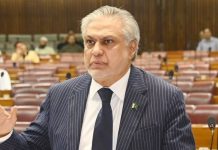| Spokesperson reiterates Afghan soil will not be used against any country
From Our
Correspondent
KABUL: Afghan Taliban spokesperson Zabihullah Mujahid on Wednesday rejected some media reports alleging that Taliban fighters carried out activities to further the unrest in Kazakhstan.
“We strongly reject such allegations and reports,” Mujahid said. “We have reiterated many times that the Afghan soil wouldn’t be used against any country, and we believe in zero interference in the affairs of other countries,” the spokesperson claimed.
He further said that the group was ready to address all grievances of any country in this regard.
“We believe in and demand a peaceful solution to the unrest of Kazakhstan and assure that we will not pose any threat or danger to the peaceful environment of the neighbourhood,” Mujahid said.
Earlier in January, Kazakhstan’s president imposed a state of emergency in the largest city Almaty and an oil-rich western region after unprecedented protests, that began over a regional energy price hike, engulfed other parts of the vast ex-Soviet country. The southeastern city of Almaty, Kazakhstan’s financial capital, was in chaos as police fired tear gas and stun grenades to quell unrest that began in the west of the country over a spike in local prices for Liquified Petroleum Gas (LPG).
President Kassym-Jomart Tokayev signed orders on states of emergency in Almaty and the hydrocarbon-rich western region of Mangystau effective from January 5 until January 19, the presidential website reported.
On the other hand, Some public universities opened in Afghanistan on Wednesday for the first time since the Taliban seized power in August, with a trickle of women attending classes that officials said would be segregated by sex.
Most secondary schools for girls and all public universities were shuttered when the hardline group stormed back to power, sparking fears women would again be barred from education — as happened during the Taliban’s first rule, from 1996-2001.
“It’s a moment of joy for us that our classes have started,” said Zarlashta Haqmal, who studies law and political science at Nangarhar University.
“But we are still worried that the Taliban might stop them,” she told AFP.
Khalil Ahmad Bihsudwal, the head of Nangarhar University, told Reuters male and female students at the institution would attend separate classes, a practice already in place in many provinces.
Officials said universities in the warmer provinces of Laghman, Nangarhar, Kandahar, Nimroz, Farah and Helmand opened on Wednesday. Tertiary institutions in colder areas, including Kabul, are due to resume on February 26.
Correspondent saw just six women — wearing the all-covering burqa — enter Laghman University early on Wednesday.
Taliban fighters guarded the entrance, a tripod-mounted machine gun resting on a boom gate.
One employee said classes would be segregated, with women taught in the mornings and men in the afternoon.
The Taliban administration had not officially announced its plan for female university students, but education officials told women were permitted to attend classes on the proviso they were physically separated from male students.
The United Nations late on Tuesday praised the inclusion of female students at the country’s public universities, appearing to indicate official confirmation.
“[The] UN welcomes the announcement that public universities will begin reopening [on] February 2 to all female and male students. So crucial that every young person has equal access to education,” the UN’s mission to Afghanistan said in a tweet late on Tuesday while Special Representative Deborah Lyons called for supporting the students.
Wednesday’s reopening of some universities comes a week after a Taliban delegation held talks with Western officials in Norway, where they were pressed on improving the rights of women to unlock billions of dollars in seized assets and frozen foreign aid.
The halting of aid has triggered a humanitarian crisis in Afghanistan, which has already been devastated by decades of war.
No country has yet recognised the new Taliban regime, which has promised a softer version of the harsh rule that characterised their first stint in power.
The regime has imposed several restrictions on women that have seen them banned from many government jobs.
The Taliban say all girls’ schools will reopen by the end of March.




